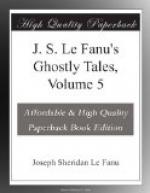They found half-a-dozen love-letters signed “Francis,” and calling the dead woman “Laura.”
So Farmer Lew called the little girl Laura; and her sobriquet of “Silver Bell” was derived from a tiny silver bell, once gilt, which was found among her poor mother’s little treasures after her death, and which the child wore on a ribbon round her neck.
Thus, being very pretty and merry, she grew up as a North-country farmer’s daughter; and the old man, as she needed more looking after, grew older and less able to take care of her; so she was, in fact, very nearly her own mistress, and did pretty much in all things as she liked.
Old Mall Carke, by some caprice for which no one could account, cherished an affection for the girl, who saw her often, and paid her many a small fee in exchange for the secret indications of the future.
It was too late when Mother Carke reached her home to look for a visit from Laura Silver Bell that day.
About three o’clock next afternoon, Mother Carke was sitting knitting, with her glasses on, outside her door on the stone bench, when she saw the pretty girl mount lightly to the top of the stile at her left under the birch, against the silver stem of which she leaned her slender hand, and called,
“Mall, Mall! Mother Carke, are ye alane all by yersel’?”
“Ay, Laura lass, we can be clooas enoo, if ye want a word wi’ me,” says the old woman, rising, with a mysterious nod, and beckoning her stiffly with her long fingers.
The girl was, assuredly, pretty enough for a “lord” to fall in love with. Only look at her. A profusion of brown rippling hair, parted low in the middle of her forehead, almost touched her eyebrows, and made the pretty oval of her face, by the breadth of that rich line, more marked. What a pretty little nose! what scarlet lips, and large, dark, long-fringed eyes!
Her face is transparently tinged with those clear Murillo tints which appear in deeper dyes on her wrists and the backs of her hands. These are the beautiful gipsy-tints with which the sun dyes young skins so richly.
The old woman eyes all this, and her pretty figure, so round and slender, and her shapely little feet, cased in the thick shoes that can’t hide their comely proportions, as she stands on the top of the stile. But it is with a dark and saturnine aspect.
“Come, lass, what stand ye for atoppa t’ wall, whar folk may chance to see thee? I hev a thing to tell thee, lass.”
She beckoned her again.
“An’ I hev a thing to tell thee, Mall.”
“Come hidder,” said the old woman peremptorily.
“But ye munna gie me the creepin’s” (make me tremble). “I winna look again into the glass o’ water, mind ye.”
The old woman smiled grimly, and changed her tone.
“Now, hunny, git tha down, and let ma see thy canny feyace,” and she beckoned her again.




